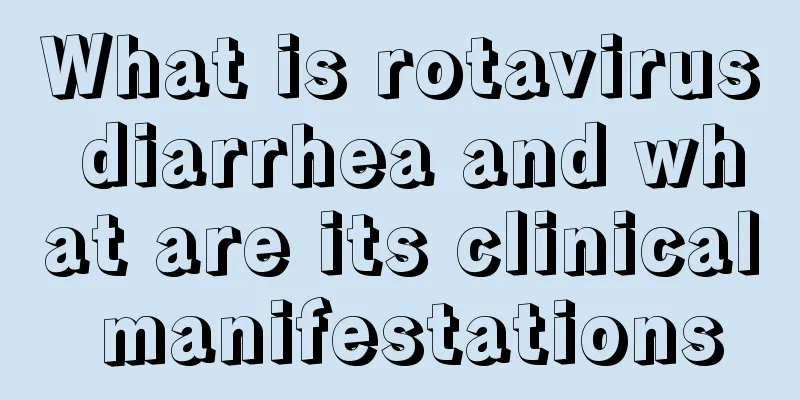What is rotavirus diarrhea and what are its clinical manifestations

|
Rotavirus is very common in infants. After infection, patients will have obvious diarrhea symptoms. This virus will cause certain damage to the patient's gastrointestinal tract. And rotavirus can be spread through the baby's feces. Rotavirus diarrhea is a gastrointestinal infectious diarrhea caused by rotavirus. Rotavirus mainly attacks children under 5 years old from November to May of the following year and is one of the main causes of death in children in autumn and winter. Almost all children are infected with rotavirus before the age of 5. According to statistics, there are approximately 111 million to 135 million cases of rotavirus diarrhea worldwide each year, resulting in the deaths of 650,000 infants. In my country, approximately 18 million infants and young children suffer from rotavirus gastroenteritis every year, and 30,000 to 40,000 die. Clinical symptoms As the weather gets colder, rotavirus diarrhea is a serious threat to the health of infants and young children. Caused by rotavirus, children infected generally develop clinical symptoms of acute gastroenteritis, namely watery diarrhea, accompanied by fever, vomiting and abdominal pain. The diarrhea is mostly white rice soup or yellow-green egg drop-like watery stools with a foul odor. In severe cases, dehydration and complications such as pneumonia, toxic myocarditis, etc. may lead to death. Mode of transmission Rotavirus is highly contagious and is mainly transmitted through the fecal-oral route, but can also be transmitted through the respiratory tract. Young children can be infected through contact with contaminated hands, toys, etc. General Prevention General preventive measures include encouraging breastfeeding and developing good hygiene habits; taking children to public places less often to avoid cross infection; and adding or removing clothes for children in a timely manner. But the most effective means of prevention is vaccination. The World Health Organization (WHO) believes that except for vaccines, there is no effective way to completely eliminate rotavirus or its transmission. Practice has shown that rotavirus vaccination can effectively reduce or alleviate diarrhea symptoms, thereby reducing morbidity and mortality. It is the only and most economical means of preventing rotavirus diarrhea in infants and young children, especially severe diarrhea. |
<<: Can people with spleen and stomach problems drink crucian carp soup?
>>: What can’t you eat if you have conjunctivitis?
Recommend
Can crab and pumpkin be eaten together
Crab and pumpkin can be taken at the same time wi...
How many stages does kidney cancer of 5cm belong to
What stage does kidney cancer of 5 cm belong to? ...
The efficacy and function of pomegranate bracelet
In our lives, many women prefer to wear bracelets...
Signs that a man is deeply hurt in love
In a romantic relationship, getting hurt is a com...
Bladder cancer treatment options
What are the treatment options for bladder cancer...
The best way to remove moles, common methods of removing moles
Especially female friends don’t like to have too ...
What should I do if the baby doesn't move during fetal heart monitoring
After a woman becomes pregnant, she needs to have...
Precautions for surgical approach of humeral shaft fracture
There are generally three causes of humeral shaft...
Use of restraint belts
Restraint belts are used relatively frequently in...
Cold sweats on chest at 3am
In our current lives, many people have frequent n...
What is a swollen inguinal lymph node?
Inguinal lymph node lumps are a common physical d...
Treatment of otitis media after radiotherapy for nasopharyngeal carcinoma
Nasopharyngeal carcinoma is mainly poorly differe...
What should I do if my stomach is bloated and I feel inflammation in my intestines?
Stomach bloating is a common disease. If you have...
What are the symptoms of brain cancer metastasis
The best time to treat cancer is in the early sta...
What is the spread and metastasis of liver cancer?
In recent years, liver cancer has become one of t...









